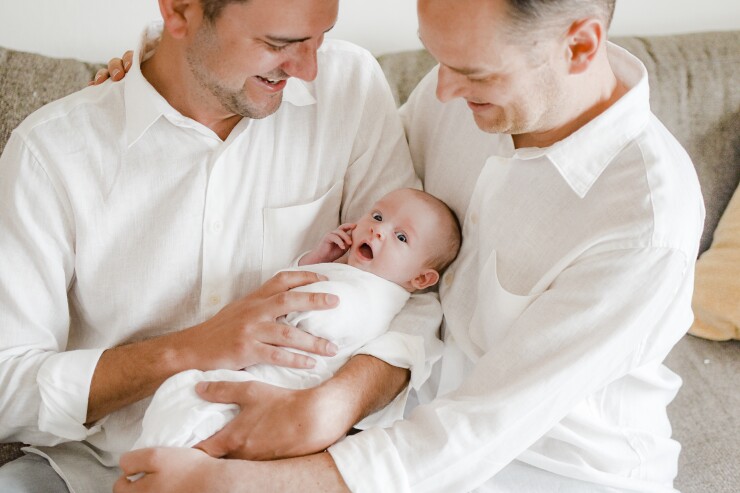On a Sunday in April earlier this year,
"It was really, really fast," Brunsdale says. But the reality of the couple's journey to parenthood was much longer.
Brunsdale, who is the head of benefits and global mobility at Lyft, met his partner, Wesley Tafoya, nearly 14 years ago, and on their first date, both expressed their hopes for becoming fathers one day. But a combination of circumstances — from a lack of equitable family-building employee benefits to unexpected failed adoptions — delayed that journey for the pair.
Read more:
Now, Brunsdale is working to ensure that
Early in the couple's relationship, Brunsdale started working at American Airlines, where the benefits team introduced
"It didn't really work for LGBTQ couples or single people that couldn't conceive on their own, it just wasn't equitable," he says. "The cost was just too expensive for us at the time, so we put it off, and we put it off."
As Brunsdale's career took him to new companies, he found opportunities to expand family-building benefits for his colleagues. At Bay Area tech company Samsara, a reimbursement of $30,000 was offered in partnership with Carrot Fertility to help cover the costs of adoption, surrogacy or egg donation. After moving to Lyft in 2021, he and his team expanded an existing reimbursement program for third-party family-planning programs from $10,000 to $40,000 for all family planning services, in partnership with benefit provider Kindbody.
Read more:
"When I got to Lyft, the fertility side of the benefit was very, very generous coverage for fertility cycles. While the $10,000 the reimbursement for adoption and surrogacy was good within the industry, it didn't feel equitable — four cycles of IVF can easily reach $80,000," he says. "So one of the first things I did was make that reimbursement richer. It's something I really believe in, and I was lucky that leadership at Lyft really believes in benefits equity."
For employers, Brunsdale points out that the number of employees who will ultimately use a fertility benefits program is relatively low; for third-party family-building benefits that support adoption and surrogacy, he says, the use case is even lower — meaning the cost is minimal from a business perspective. But for hopeful families, it's a life-changing benefit.
"It makes a world of difference," Brunsdale says. "If you're saying you're an employer that promotes diversity, having an equitable program across the board really shows that."
Brunsdale and Tafoya personally embraced the offerings at each of these respective organizations. The total financial support helped cover the $60,000 they ultimately spent on the adoption journey — from agency fees and home studies to legal fees and birthing expenses. Yet, he sees an opportunity to push third-party family-building programs to be more supportive, and provide even more
Read more:
He looks back on last year, when he and his husband were initially matched with a birth mother in Texas who was seven weeks pregnant. The three were in "constant communication" throughout the pregnancy, and she encouraged Brunsdale and his husband to be present for the birth. But once they arrived, they couldn't get in touch with the birth mother — for a week and a half.
"We just went home, and finally she contacted the agency and said she had changed her mind," he says. "They do tell you in adoption not to buy strollers or get the nursery ready, but we couldn't help ourselves. A little more focus and support on those unexpected things would have been helpful."
As their journey progressed, Kindbody did connect the couple with an adoption expert who was able to provide more insight to the process, a resource that Brunsdale calls "eye-opening." While the failed adoption was a painful experience for him and his husband, Brunsdale is looking on the bright side: When they got the call that Olivia would be theirs, the couple was all-too prepared to welcome the little girl into their home.
Read more:
As he settles into life as a dad, Brunsdale is already spotting opportunities to further expand benefits to support parents, not just through the family-building journey, but beyond. At Lyft, he has created a comprehensive return-to-work program for parents coming back from family leave. As companies — including Lyft — create post-pandemic return-to-office plans for their workforces, he encourages leaders to revisit their holistic benefit offerings and cultural programs.
"There's more we can do around child care support, and managers should feel supported to encourage flexibility for their teams," he says. "Now that I'm a parent, I'm definitely going to put a bigger focus on that."





